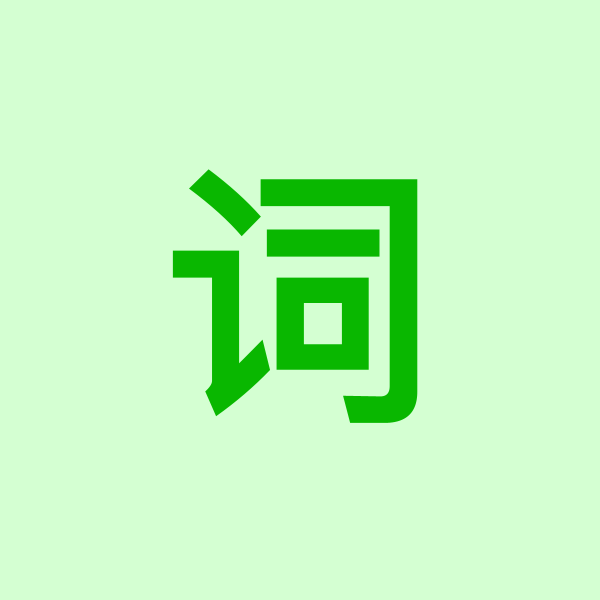
英语单词大百科
**off**
**音标**:
英音:[ɒf]
美音:[ɔːf]
**中文释义**:
介词、副词、形容词、名词、动词,表示“离开(某处);在…的外面;在…的沿海;(非正式)表示接受或赞成;(体育比赛中)比…差;离开(某人)的视线;从…上下来;偏离;从…上去掉;下班;休息;(非正式)停止做某事;不在工作;被关闭;关闭着的;风、雨等已停;(非正式)不参加;不在状态;结束;取消;(非正式)离开;走开;(非正式)不工作;休息;(非正式)不参加;(电器等)关闭的;偏离正常轨道的;轮空的;未击中的;(板球)未得分的;(非正式)令人厌烦的”。其中,作为“关闭”解释时,是关的意思。
**单词起源**:
“Off”一词的起源可以追溯到中古英语时期的“of”,意为“从”或“离开”。随着时间的推移,其含义逐渐扩展,包括了现代英语中的多种用法。
**单词详细讲解**:
“Off”是一个极为常用的多词性单词,在不同语境下有着丰富的含义。作为介词,它常表示空间或时间上的离开;作为副词,它可以描述动作或状态的中断或偏离;作为形容词,它通常用来描述某物处于关闭或不工作的状态;作为名词,它有时表示轮空或未得分的情况;作为动词,它则意为“离开”或“取消”。
**助记技巧**:
1. 联想记忆:想象一个人从某个地方“走开”,这就是“off”作为“离开”的意思。
2. 形象记忆:将“o”想象成一个圆圈,代表一个完整的状态,而“ff”像是被切断的两段线,表示状态被“关闭”或“中断”。
3. 语音记忆:“off”的发音与“奥夫”相近,可以联想到“奥特曼离开(off)了”。
4. 词根词缀记忆:“off”本身就是一个常见的词根或词缀,表示“离开”或“关闭”的意思。
5. 场景记忆:想象你在看电视时,按下遥控器上的“off”按钮,电视就关闭了。
**常用词组**:
1. off duty 下班
2. turn off 关掉
3. off and on 时断时续地
4. set off 动身;出发
5. call off 取消
**词根词缀及记忆方法**:
“Off”本身就是一个常见的词根或词缀,表示“离开”或“关闭”的意思。在记忆时,可以结合其常见用法和语境进行联想和巩固。
**单词造句**:
1. Please turn off the lights when you leave the room. 离开房间时请关灯。
2. He is off duty today. 他今天下班了。
3. The concert was called off due to bad weather. 音乐会因天气恶劣而取消。
4. I felt a bit off today and didn't go to work. 我今天感觉不太舒服,没去上班。
5. The power went off suddenly. 突然停电了。
**名著小说中含有该词的句子**:
1. **出处**:《傲慢与偏见》(Pride and Prejudice) by Jane Austen
**句子**:"The carriage was sent off immediately, and every thing seemed to be done in the right style."
**翻译**:“马车立刻被派走了,一切似乎都按规矩办妥了。”
2. **出处**:《了不起的盖茨比》(The Great Gatsby) by F. Scott Fitzgerald
**句子**:"He had come a long way to this blue lawn, and his dream must have seemed so close that he could hardly fail to grasp it."
**翻译**:“他长途跋涉来到这片蓝色的草坪上,他的梦想似乎近在咫尺,他几乎不可能抓不住它。”(注:此句中“off”未直接出现,但“come a long way”隐含了“远离”原点的意思,与“off”的“离开”含义相呼应。)
3. **出处**:《双城记》(A Tale of Two Cities) by Charles Dickens
**句子**:"It was the best of times, it was the worst of times, it was the age of wisdom, it was the age of foolishness, it was the epoch of belief, it was the epoch of incredulity, it was the season of Light, it was the season of Darkness, it was the spring of hope, it was the winter of despair, we had everything before us, we had nothing before us, we were all going direct to Heaven, we were all going direct the other way—in short, the period was so far like the present period, that some of its noisiest authorities insisted on its being received, for good or for evil, in the superlative degree of comparison only."
**翻译**:“那是最美好的时代,那是最糟糕的时代;那是智慧的年头,那是愚昧的年头;那是信仰的时期,那是怀疑的时期;那是光明的季节,那是黑暗的季节;那是希望的春天,那是失望的冬天;我们全都在直奔天堂,我们全都在直奔相反的方向——简而言之,那时跟现在非常相象,某些最喧嚣的权威坚持要用形容词的最高级来形容它。说它好,是最高级的;说它不好,也是最高级的。”(注:此段中虽未直接出现“off”,但整体描绘了时代的对比与变迁,隐含了“离开”或“转变”的意味。)
4. **出处**:《简·爱》(Jane Eyre) by Charlotte Brontë
**句子**:"I was now in my own room, and had dismissed Adèle to bed. I stood with the candle in my hand, looking at the fire, and thinking over the events of the evening."
**翻译**:“现在我回到了自己房里,已经打发阿黛尔上床睡了。我拿着蜡烛站着,望着炉火,思考着晚上的种种事情。”(注:此句中“dismissed…to bed”隐含了“离开(房间)去睡觉”的意思,与“off”的“离开”含义相关。)
5. **出处**:《飘》(Gone with the Wind) by Margaret Mitchell
**句子**:"She was off to Tara, to Mother, and safety."
**翻译**:“她要回塔拉去,回到母亲身边去,回到安全的地方